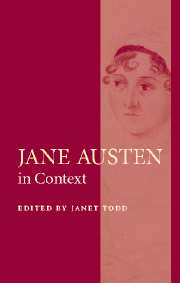32 - Philosophy
Published online by Cambridge University Press: 19 December 2020
Summary
Unions of fiction and philosophy have generally turned out for the worse, and novelists of the great tradition in its later phase are famous for having shrunk at the prospect. Lawrence colourfully described the hurt done by moral systems to his sacred genre in the imagery of crucifixion – at best the novel was able to walk away with the nail; and the mere thought of having a philosophy caused Conrad to groan, ‘shall I die of it do you think?’ If Jane Austen was untroubled by these post-Romantic demurs it was not because she was a didactic novelist of an older mould, but rather that she shared the outlook of a movement that itself arose in reaction against the dogmatic.
The ‘philosophical character’ of Austen's work was hailed, a few years after her death, by the critic Richard Whately, who revealingly applied the term to her entire conception of the novel, even indeed to the new school of fiction which she was seen to head. Whately was not alone in distinguishing the central features of the new novel as fine observation and a deep concern for probability, but he based his high claims for Jane Austen on Aristotle's idea that mastery of the probable is a guarantee of insight into the way things work. It was from science that this idea crossed to literature in the Poetics, and Whately updates the scientific analogy by equating Austen's approach to human nature with the method of the naturalist who relates minute detail to a range of suppositions about function and form. Whately became an Archbishop, and his essay has been cited as evidence that Jane Austen's Christian beliefs fuelled her rising fame, but a better clue to its drift is that he was, at the time, an enlightened don, already well launched on his first career as a political economist. When the editor-to-be of Francis Bacon begins to enlarge on the philosophical character of Austen's work it is the so-called ‘experimental method’ of the new humanities that holds the stage.
- Type
- Chapter
- Information
- Jane Austen in Context , pp. 346 - 356Publisher: Cambridge University PressPrint publication year: 2005
- 3
- Cited by



